INTRODUCTION
During the celebrations of the 25th anniversary of the Academia de Música S. Pio X (St. Pius X Academy of Music), a special day was devoted to Portuguese music and composers. Curiously enough, at the concert there were three works by three Portuguese composers of different generations and even more dissimilar aesthetic orientation -- Lopes Graça, Filipe de Sousa and Simão Barreto -- all based on the same poetic text: Camilo Pessanha's A Clepsidra. Portuguese culture was greatly enriched by those works, and if there were ethical and aesthetic conflicts, they went unnoticed.
Two of the pieces in the Clepsidra I ("Clepsidra I") cycle: "Ao Longe os Barcos de Flores ("Flower Boats in the Distance") and "Viola Chinesa" ("Chinese Guitar"), were performed that day and seem to have been well received by the audience, even by the anti-modernists and the anti-avant-gardists. Perhaps people were just being polite. Or perhaps they genuinely liked them. Those pieces were subsequently published in facsimile in Two Scores by Simão Barreto ("Review of Culture", Macau, (3) 1987, pp. 45-52).
Camilo Pessanha's poetry is the greatest expression of Portuguese symbolistic poetry. It may be less esoteric than that of Mário de Sá-Carneiro, who introduced modernism to Portugal, but it is undoubtedly more hermetic and more difficult, which makes it extremely hard to interpret.
There have been, and there will be, other musical interpretations of Pessanha's poetic works. In the two cycles, the musical ideas cannot successfully interpret the meaning of Pessanha's poetry. For this reason, in this instance the music does not interpret, but merely suggests, following along as an independent art that is combined with the poetry, not to supplement it or enhance its value, but rather to create a new artistic dimension: the sublimation of the union of the musical sounds with the sound and idea of the words. On the one hand there is the music and on the other the poetry, and together they make a new whole, with neither one absorbing or annihilating (assimilating) the other.
Another idea that I tried to outline here very briefly, unfortunately (or due to my inability), is that of two cultures (Portuguese and Chinese) that have never merged, and most certainly never will, but have coexisted for many centuries in perfect harmony in the same socio-geographic area. That is why I added texts from some chapters of Dao De Jing• by Lao Zi• to the three sonnets "Caminho" ("Road"), as well as an oriental melody based on the poem Jade Steps by Li Bai• to the musical accompaniment of "Interrogação" ("Questioning"), and why I indicated that an erhu• (Chinese violin) should play a pentatonic melody to accompany "Chinese Guitar" while the violoncello plays the same music in different rhythms and in retrograde.
I would also like to mention that eight of the twelve pieces in the "Clepsidra II" cycle are based on the same musical theme or, better yet, the same melodic line, one composed by Bach and written in German musical notation B(flat)-A-C-H(b natural). Johann Sebastian Bach himself had already used it in his last, monumental fugue (one with four themes) from his immortal work "Die Kunst der Fuge" ("The Art of Fugue"), which, unfortunately, was never completed. This line is treated and developed with a serial technique, not in the rigorous system of the Viennese masters but in a free and easy adaptation, based on greater flexibility and freedom of process, action and interpretation. It should also be noted that most of the poems in these two cycles originated at the same time as the new musical techniques.
§1."CLEPSIDRA I"
1.1. "VOZ DÉBIL QUE PASSAS"
("WEAK VOICE THAT PASSES BY")
When faced with the musical and melodic power of this short, but great, poem that is full of life and rhythm, the voice refuses to sing. Therefore, the part that is sung is almost a Sprechgesang recitative, based on an ascending chromatic scale and supported by the rhythm of the words, which naturally increases as the power of the poem increases.
"VOZ DÉBIL QUE PASSAS
Voz débil que passas,
Que hummílima gemes
Não sei que desgraças...
Dir-se-ia que pedes.
Dir-se-ia que tremes,
Unida ás paredes,
Se vens, ás escuras,
Confiar-me ao ouvido
Não sei que marguras...
Suspiras ou falas?
Porque é o gemido,
O sopro que exalas?
Dir-se-ia que rezas.
Murmuras baixinho
Não sei que tristezas...
-- Ser teu companheiro? --
Não sei o caminho.
Eu sou estrangeiro.
--Passados amores? --
Animas-te, dizes
Não sei que terrores...
Fraquinha, deliras.
-- Projectos felizes? --
Suspiras. Expiras."
("WEAK VOICE THAT PASSES BY
Weak voice that passes by,
That most humbly bemoans
I know not what misfortune...
You seem to be asking,
You seem to be trembling,
United with the walls,
If you come, in the dark,
To whisper in my ear
I know not what bitterness...
Do you sigh or do you speak?
Why is the moaning,
The breath you exhale?
You seem to be praying.
You murmur softly
I know not what sorrow...
"Me, be your companion?"
I don't know the way.
I am a foreigner.
"Past loves?"
You take heart and say
I know not what frightening things...
Weak, you rave.
"Happy plans?"
You sigh. You expire.")
1.2. "VIOLA CHINESA"
("CHINESE GUITAR")
This piece was first performed in 1987 during the celebrations of the twenty fifth anniversary of the Academia de Música S. Pio X, with Filomena Amaro and Fernando Serafim. It was subsequently published in facsimile in Two Scores by Simão Barreto ("Review of Culture", Macau, (3) 1987, pp. 45-52), pp. 50-52.
"VIOLA CHINESA
Ao longo da viola morosa
Vai adormecendo a parlenda
Sem que amadornado eu atenda
A lenga-lenga fastidiosa.
Sem que o meu coração se prenda,
Enquanto nsal, minuciosa,
Ao longo da viola morosa,
Vai adormecendo a parlenda.
Mas que cicatriz melindrosa
Há nele que essa viola ofenda
E faz que as asitas distenda
Numa agitação dolorosa?
Ao longo da viola, amorosa..."
("CHINESE GUITAR")
To the sound of the morose guitar
The idle talk subsides
And I, feeling drowsy, pay no attention
To the tiresome rigmarole.
My heart remains untouched,
As the nasal, circumstantial,
Chatter subsides,
To the sound of the morose guitar.
But what sensitive scar
Does it have that the guitar troubles it
And makes it spread its wings
In painful agitation?
To the sound of the morose guitar!...")
 Zheng 鵱
Zheng 鵱
1.3. "AO LONGE OS BARCOS DE FLORES"
("FLOWER BOATS IN THE DISTANCE")
This piece was also performed for the first time in 1987 during the celebrations of the twenty fifth anniversary of the Academia de Música S. Pio X, and it was also published in Two Scores by Simão Barreto ("Review of Culture", Macau, (3) 1987, pp. 45-52), pp. 45-49. "A lone flute cries incessantly [...]" was entrusted to a solo flute, whereas "Flower Boats in the Distance" was assigned to the piano, violin and violoncello, accompanied by percussion, a soprano and a tenor.
"AO LONGE OS BARCOS DE FLORES
Só, incessante, um som de flauta chora,
Viúva grácil, na escuridão tranquila,
--Perdida voz de entre as mais se exila,
--Festões de som dissimulando a hora.
Na orgia, ao longe, que em clarões cintila
E os lábios, branca, do carmim desflora...
Só, incessante, um som de flauta chora,
Viúva, grácil, na escuridão tranquila.
E a orquestra? E os beijos? Tudo a noite, fora
Cauta, detém. Só modulada trila
A flauta débil... Quem há-de remi-la?
Quem sabe a dor que sem razão deplora?
Só, incessante, um som de flauta chora..."
("FLOWER BOATS IN THE DISTANCE)
A lone flute cries incessantly,
A graceful widow in the tranquil obscurity,
--A lost voice that exiles itself from the rest,
--Feasts of sound dissimulating time.
In the orgy in the distance, that radiantly scintillates
And her lips, white, she stains bright red...
A lone flute cries incessantly,
A graceful widow in the tranquil obscurity.
And the orchestra? And the kisses? The night,
Cautious, withholds everything. Only the modulated
Mournful flute trills... Who will rescue it?
Who knows what pain it laments without reason?
A lone flute cries incessantly...")
1.4. "CREPUSCULAR" ("TWILIGHT")
This is the last piece in the "Clepsidra I" cycle. An Eastern sunset, on a summer's eve in São Tiago da Barra, looking towards the southern crest of the peak on Lapa Island. In the stillness of the woods, the last bird calls are heard. Boats return as others leave for a night of fishing.
"CREPUSCULAR
Há no ambiente um murmúrio de queixume,
De desejos d'amor d'ais comprimidos...
Uma ternura esparsa de balidos
Sente-se esmorecer como um perfume.
As madresilvas murcham nos silvados
E o aroma que exalam pelo espaço
Tem delíquios de gozo e de cansaço,
Nervosos, femininos, delicados.
Sentem-se espasmos, agonias d'ave,
Inapreensíveis, mínimas, serenas...
Tenho entre as mãos as tuas mãos pequenas,
0 meu olhar no teu olhar suave.
As tuas mãos tão brancas d'anemia,
Os teus olhos tão meigos de tristeza...
É este enlanguescer da natureza,
Éste vago sofrer do fim do dia."
("TWILIGHT
There is a plaintive murmur in the air,
Of longing of love, supressed moaning...
A sparse tenderness of bleating
You can feel it fading like a perfume.
The honeysuckle wilts in the bramble thicket
And the aroma it gives off into space
Swoons nervously, femininely, delicately,
From pleasure and fatigue.
Spasms are felt, like a bird in agony,
Imperceptible, minimal, serene...
I hold your small hands in mine,
My eyes look into your tender eyes.
Your hands, so anemically white,
Your eyes so gentle and sad...
It is this languishing of nature,
This vague suffering of the day's end.")
JZ>
 Qing 縺
Qing 縺
§2. "CLEPSIDRA II"
2.1. "INTERROGAÇÃO" ("QUESTIONING")
"Amor não sei se o é, mas sei que te estremeço,
Que adoecia talvez de te saber doente. "
("I don't know if this is love, but I know that I move you, That it would probably make me ill to know that you were ill.")
Clepsidra
A beloved one left in Portugal? A Chinese sweetheart? Why not? There you have the why of musical 'bilingualism'.
"INTERROGAÇÃO"
Não sei se isto é amor. Procuro o teu olhar,
Se alguma dor me fere, em busca de um abrigo;
E apesar disto crê! Nunca pensei num lar
Onde fosses feliz, e eu feliz contigo.
Por ti nunca chorei nenhum ideal desfeito.
E nunca te escrevi nenhuns versos românticos.
Nem depois de acordar te procurei no leito
Como a esposa sensual do Cântico dos
Cânticos.
Se é amar-te não sei. Não sei se te idealizo
A tua cor sadia, o teu sorriso terno...
Mas sinto-me sorrir de ver esse sorriso
Que me penetra bem, com este Sol de Inverno.
Passo contigo a tarde e sempre sem receio
Da luz crepuscular, que me enerva, que
provoca.
Eu não demoro o olhar na curva do teu seio
Não me lembrei jamais de te beijar na boca.
Eu não sei se é amor. Será talvez começo...
Eu não sei que mudança a minha alma
pressente...
Amor não sei se o é, mas sei que te estremeço,
Que adoecia talvez de te saber doente."
("QUESTIONING
I don't know if this is love. I look into your eyes,
When I am wounded, looking for shelter;
And despite that, believe me! I've never thought
of a home
Where you'd be happy, and I happy with you.
I've never cried over shattered ideals because of
you.
And never wrote you romantic verses.
And upon awakening, I never sought you in my
bed
Like the sensual bride in the Song of Songs.
Is this love? I don't know. I don't know if I idealize
you
Your healthy mien, your tender smile...
But a smile comes to my lips when I see that smile
That penetrates me like the Winter sun.
I spend the afternoon with you without fearing
The evening light, that enervates, provokes.
My eyes don't linger on the curve of your breasts
And I never thought to kiss your lips.
I don't know if this is love. It may be the beginning...
I don't know what change my soul foresees...
I don't know if this is love, but I know that I move
you,
That it would probably make me ill to know that
you were ill.")
JZ>
2.2. "RUFANDO APRESSADO" ("DRUM ROLL")
"RUFANDO APRESSADO
Rufando apressado,
E bamboleando,
Boné posto ao lado,
Garboso, o tambor
Avança em redor
Do campo de amor...
Com força, soldado!
A passo dobrado!
Bem bamboleando!
Amores te bafejem.
Que as moças te beijem.
Que os moços te invejem.
Mas ai, ó soldado!
Ó triste alienado!
Por mais exaltado
Que o toque reclame,
Ninguém que te chame...
Ninguém que te chame..."
"DRUM ROLL
Drum roll
Swinging,
Cap set on the side,
The stately drum
Goes around
The field of love...
Quickly, soldier!
Quicken the pace!
And swing along!
May love keep you warm.
May the girls kiss you.
May the guys envy you.
But wait, soldier!
Oh sad, alienated man!
All the more exalted
May the beat protest,
No one to call you...
No one to love you...")
JZ>
2.3. "AGUA MORRENTE" ("DYING WATER")
"II pleure dans mon cœur
Comme il pleut sur la ville."
JZ>
Paul Verlaine
"ÁGUA MORRENTE
Meus olhos apagados,
Vede a água cair.
Das beiras dos telhados,
Cair, sempre cair.
Das beiras dos telhados,
Cair, quase morrer...
Meus olhos apagados,
E, cansados de ver.
Meus olhos, afogai-vos
Na vã tristeza ambiente.
Caí e derramai-vos
Como a água morrente."
"DYING WATER
My lifeless eyes,
See the water falling.
From the edges of the roofs.
Falling, falling incessantly.
From the edges of the roofs,
Falling, nearly dying...
My lifeless eyes,
And: tired of seeing.
My eyes, drown yourselves
In the empty surrounding sadness.
Fall and overflow
Like the dying water.")
JZ>
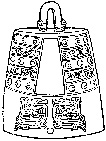 Zhong 笘
Zhong 笘
2.4. "VIOLONCELO" ("VIOLONCELLO")
"VIOLONCELO
Chorai arcadas
Do violoncelo!
Convulsionadas,
Pontes aladas
De pesadelo...
De que esvoaçam,
Brancos, os arcos...
Por baixo passam,
Se despedaçam,
No rio, os barcos.
Fundas, soluçam
Caudais de choro...
Que ruínas (ouçam)!
Se se debruçam,
Que sorvedouro!...
Trémulos astros...
Solidões lacustres...
-- Lemos e mastros...
E os alabastros
Dos balaústres!
Urnas quebradas!
Blocos de gelo...
--Chorai arcadas,
Despedaçadas, Do violoncelo."
("VIOLONCELLO
Cry, bows
Of the violoncello! Convulsed,
Winged bridges
From nightmares...
From which flicker,
White bows...
The boats on the river,
Pass underneath,
And are wrecked.
Deep, they shed
A flood of tears...
What shipwrecks (listen)!
If you lean forward,
What a maelstrom!...
Flickering stars...
Lake retreats...
-- Rudders and masts...
And the alabaster
Of the rails!
Broken urns!
Blocks of ice...
-- Cry, bows,
Broken bows,
Of the violoncello.")
JZ>
2.5. "CAMINHO" ("ROAD")
Three marvellous sonnets. Three difficult, enigmatic sonnets. A reason for adding to each one a passage from Dao De Jing•(The Way and the Virtue) by Lao Zi, • to be recited in Chinese.
JZ>
2.5.1. "CAMINHO I" ("ROAD I")
"Vou a medo na aresta do futuro."
("I approach the future with caution.")
JZ>
Clepsidra
“此兩者,同出而異名,同謂之玄,玄之又玄,眾少之門”
("The way and virtue, this two-in-one is the greatest mystery of all, the door to all wonders.")
JZ>
Dao De Jing (chapter 1).
"CAMINHO I
Tenho sonhos cruéis; n'alma doente
Sinto um vago receio prematuro.
Vou a medo na aresta do futuro,
Embebido em saudades do presente...
Saudades desta dor que em vão procuro
Do peito afugentar bem rudemente,
Devendo, ao desmaiar sobre o poente,
Cobrir-me o coração dum véu escuro!...
Porque a dor, esta falta d'harmonia,
Toda a luz desgrenhada que alumia
As almos doidamente, o céu d'agora,
Sem ela o coração é quase nada:
Um sol onde expirasse a madrugada,
Porque é só madrugada quando chora."
("ROAD I
I have cruel dreams; in my aching soul
I feel a vague premature fear.
I approach the future with caution,
Longing for the present...
Longing for this pain I try in vain
To chase roughly from my breast,
Having to cover my heart with a dark veil,
As the sun sets!...
Because pain, this lack of harmony,
All the harsh light
That sets souls on fire, lights up the sky,
Without it, the heart is almost nothing:
A sun in which dawn expires,
Because dawn only comes when you cry.")
JZ>
2.5.2. "CAMINHO II"("ROAD II")
"Bom dia companheiro [...]
a jornada é maior indo sózinho."
("Good morning, friend [...] t
he journey is longer when you travel alone. ")
JZ> Clepsidra
“知人者智也,自智者明”
("He who knows others is enlightened He who knows himself is wise.")
JZ>
Dao De Jing (chapter 33).
"CAMINHO II
JZ>
Encontraste-me um dia no caminho
Em procura de quê, nem eu o sei.
-- Bom dia, companheiro -- te saudei,
Que a jornada é maior indo sózinho.
É longe, é muito longe, há muito espinho!
Paraste a repousar eu descansei...
Na venda em que poisaste, onde poisei,
Bebemos cada um do mesmo vinho.
É no monte escabroso, solitário.
Corta os pés como a rocha dum calvário,
E queima como a areia!... Foi no entanto
Que chorámos a dor de cada um...
E o vinho em que choraste era comum:
Tivemos que beber do mesmo pranto."
("ROAD II
You met me on the road one day
Searching for I know not what.
"Good morning, friend," I said,
The journey is longer when you travel alone,
It is far, very far, there are many thorns!
You stopped to rest and I rested...
In the shop where you stopped, where I stopped,
We drank of the same wine.
It is on the steep, solitary hill.
It cuts your feet like the cliff of a calvary,
And burns like beach sand!... In the meantime
We wept over each other's fate...
And the wine you cried into was common;
We had to shed the same tears.")
JZ>
5.1.3. "CAMINHO III" ("ROAD III")
"Vou sózinho, quero estar só no caminho."
("I walk alone, I want to take this road alone. ")
JZ>
Clepsidra
“道常無名,樸雖小,天下莫能臣也”
("Eternal, nameless, the way, small in its raw simplicity, is above all worldly things.")
Dao De Jing (chapter 32).
JZ>
"CAMINHO" III
Fez-nos bem, muito bem, esta demora:
Enrijou a coragem fatigada...
Eis os nossos bordões da caminhada
Vai já rompendo o sol: vamos embora.
Este vinho, mais virgem do que a aurora,
Tão virgem não o temos na jornada...
Enchamos as cabaças: pela estrada,
Daqui inda este néctar avigora!...
Cada um por seu lado!... eu vou sózinho,
Eu quero arrostar só todo o caminho,
Eu posso resistir à grande calma!...
Deixai-me chorar mais e beber mais,
perseguir doidamente os meus ideais,
E ter fé e sonhar -- encher a alma."
("ROAD III
That stop did us good, much good:
It built up our failing courage...
Here are our walking sticks,
The sun is already rising: let's move on.
This wine, more virginal than the dawn,
So virginal we don't drink it during our journey...
We fill our gourds: along the road,
From here still this nectar invigorates!...
We go our separate ways!... I go alone,
I want to face the road alone,
I can bear the solitude!...
Let me cry more and drink more,
Pursue my ideals furiously,
And have faith and dream -- to fill my soul.")
JZ>
2.6. "ESTÁTUA" ("STATUE")
Statue of cold, discreet marble,
"Severo como um túmulo fechado,
Sereno como um pélago quieto."
("As severe as a closed tomb,
As serene as a calm sea.")
JZ>
Clepsidra
Here the music is almost static. This is imposed by the immobility of the cold marble statue.
"ESTÁTUA"
Cansei-me de tentar o teu segredo:
No teu olhar sem cor --frio escalpelo,
O meu olhar quebrei, a debatê-lo,
Como a onda na crista dum rochedo.
Segredo dessa alma e meu degredo
E minha obsessão! Para bebê-lo
Fui teu lábio oscular, num pesadelo,
Por noites de pavor, cheio de medo.
E o meu ósculo ardente, alucinado,
Esfriou sobre o mármore correcto
Desse entreaberto lábio gelado...
Desse lábio de mármore, discreto,
Severo como um túmulo fechado,
Sereno como um pélago quieto."
("STATUE
Trying to guess your secret wore me out:
In your colourless eyes -- cold scalpel,
I broke my gaze, wrestling with it,
Like a wave on the crest of a rock.
The secret of your soul and my exile
And my obsession! To drink of it
I kissed your lips, in a nightmare,
On nights of terror, full of fear.
And my burning, passionate kiss,
Turned cold on the flawless marble
Of those cold parted lips...
Of those discreet marble lips,
That are as severe as a closed tomb,
As serene as a calm sea.")
JZ>
2.7. "ESVELTA SURGE" ("SVELTE, SHE EMERGES")
A 'flash' as Venus emerges from the sea, "svelte" and seductive.

Bo鎛
"ESVELTA SURGE
Esvelta surge! Vem das águas, nua,
Timonando uma concha alvinitente!
Os rins flexíveis e o seio fremente...
Morre-me a boca por beijar a tua.
Sem vil pudor! Do que há que ter vergonha?
Eis-me formoso, moço e casto, forte.
Tão branco o peito!-para o expor á Morte...
Mas que ora--a infame! Não se te anteponha.
A hidra torpe!... Que a estrangulo... Esmago-a
De encontro à rocha onde a cabeca te há-de,
Com os cabelos escorrendo água,
Ir inclinar-se, desmaiar de amor,
Sob o fervor da minha virgindade
E o meu pulso de jovem gladiador."
("SVELTE, SHE EMERGES
Svelte, she emerges! Rises naked from the water,
Holding a brilliant white shell!
Her ribs supple, her bosom trembling...
How I yearn to kiss you.
Without vile modesty! What is there to be ashamed of?
Here I am handsome, young and chaste, strong.
A chest too white!--to expose to Death...
But--it's infamous! I hope it doesn't favour you.
The torpid hydra!... I will strangle it... Crush it
Against the cliffs where your head will,
Your hair dripping wet,
To go lie down, faint because of love,
Of the fervour of my virginity
And my young gladiator's energy.")
JZ>
2.8. "NO CLAUSTRO DE CELAS" ("IN THE CLOISTER OF THE CELLS")
An abandoned convent... The walls are bare, but they still reflect the cloistered environment, the temple of prayer.
This piece was the highlight of the 18th of January 1989 meeting of the Elos Clube, in a version for orator, accompanied by a flute, a violin and two violas.
"NO CLAUSTRO DE CELAS"
Eis quanto resta do idílio acabado,
-- Primavera que durou um momento...
Como vão longe as manhãs do convento!
-- Do alegre conventinho abandonado...
Tudo acabou... Anémonas, hidrângeas,
Silindras -- flores tão nossas amigas!
No claustro agoram viçam as ortigas,
Rojam-se cobras pelas velhas lájeas.
Sobre a inscrição do teu nome delido!
-- Que os meus olhos podem soletrar.
Cansados... E o aroma fenecido
Que se evola do teu nome vulgar!
Enobreceu-o a quietação do olvido,
Ó doce, ingénua, inscrição tumular."
("IN THE CLOISTER OF THE CELLS
Here's what's left of the idyll that has ended,
-- A Spring that lasted but an instant...
The mornings at the convent are long gone!
--At the cheerful little convent that is now abandoned
All is gone, the anemones, the hydrangeas,
The mock oranges -- flowers that were such good friends!
The cloister is now overrun with nettles,
And snakes crawl over the old flagstones.
Over the worn inscription of your name!
-- That my eyes can barely make out,
Tired... And the dissipated aroma
That emanates from your common name!
Ennobled by the stillness of oblivion,
Oh sweet, ingenuous grave inscription.")
JZ>
2.9. "IMAGENS QUE PASSAIS PELA RETINA"
("IMAGES THAT PASS BY THE RETINA")
Splashes of sound, suggestive of images that pass, appear and disappear.
"IMAGENS QUE PASSAIS PELA RETINA
Imagens que passais pela retina
Dos meus olhos, porque não vos fixais?
Que passais como a água cristalina
Por uma fonte para nunca mais!...
Ou para o lago escuro onde termina
Vosso curso, silente de juncais,
E o vago medo angustioso domina.
-- Porque ides sem mim, não me levais?
Sem vós que são os meus olhos abertos?
-- O espelho inútil, meus olhos pagãos!
Aridez de sucessivos desertos...
Fica sequer, sombra das minhas mãos,
Flexão casual de meus dedos incertos,
--estranha sombra em movimentos vãos."
("IMAGES THAT PASS BY THE RETINA
Images that pass by the retina
Of my eyes, why can't I retain you?
You pass like crystalline water
Through a fountain, to never again!...
Or to the dark lake where
Your course ends, the silence of rushes,
And the vague anguished fear dominates,
-- Why do you go without me? Won't you take me with you?
Without you, what are my open eyes?
-- A useless mirror, my pagan eyes!
The dryness of successive deserts...
Stay at least, shadow of my hands,
Casual flexing of my unsure fingers,
-- A strange shadow in vain movements.")
JZ>
2.10. "DEPOIS DA LUTA E DEPOIS DA CONQUISTA"
("AFTER THE BATTLE AND AFTER THE CONQUEST")
“得與亡孰病?”
("To win or to loose
Which is most painful?")
JZ>
Dao De Jing (chapter 44)
"DEPOIS DA LUTA
E DEPOIS DA CONQUISTA
Depois da luta e depois da conquista
Fiquei só! Fora um acto antipático!
Deserta a Ilha, e no lençol aquático
Tudo verde, verde--a perder de vista.
Porque vos fostes, minhas caravelas,
Carregadas de todo o meu tesoiro?
-- Longas teias de luar de lhama de oiro.
Legendas a diamantes das estrelas!
Quem vos desfez, formas inconsistentes
Por cujo amor escalei a muralha.
-- Leão armado, uma espada nos dentes?
Felizes vós ó mortos na batalha!
Sonhais, de costas, nos olhos abertos
Reflectindo as estrelas, boquiabertos..."
("AFTER THE BATTLE
AND AFTER THE CONQUEST
After the battle and after the conquest
I was left alone! It was an antipathetic act!
The island is deserted, and on a watery sheet
Everything is green, green -- as far as the eye can see.
Why did you leave, my caravels
Loaded with all my treasures?
-- Long streams of moonlight of gold filigree.
Inscribed with diamonds from the stars!
Who undid you, inconsistent forms
For whose love did I scale the wall,
-- Armed lion, a sword in its teeth?
Lucky are those who died in battle!
You dream, on your backs, eyes open
Reflecting the stars, lips parted...")
JZ>
2.11. "FLORIRAM POR ENGANO AS ROSAS BRAVAS"
("WILD ROSES BLOSSOMED BY MISTAKE")
"FLORIRAM POR ENGANO AS ROSAS BRAVAS
Floriram por engano as rosas bravas
No Inverno: veio o vento desfolhá-las...
Em que cismas, meu bem? Porque me calas
As vozes com que há pouco me enganavas?
Castelos doidos! Tão cedo caístes!...
Onde vamos, alheio o pensamento,
De mãos dados? Teus olhos, que um momento
Perscrutaram os meus, como vão tristes!
E sobre nós cai nupcial a neve,
Surda, em triunfo, pétalas, de leve
Juncando o chão, na acrópole de gelos...
Em redor do teu vulto é como um véu!
Quem as esparze -- quanta flor! -- do céu,
Sobre nós dois, sobre os nossos cabelos?"
("WILD ROSES BLOSSOMED BY MISTAKE
The wild roses blossomed by mistake
In the winter: the wind blew off their leaves...
What are you dwelling upon, my love? Why do you silence
The voices with which you wronged me a short time ago?
Crazy castles! You fell so soon!...
Where are we headed, absentmindedly,
Hand in hand? Your eyes, which once
Looked deeply into mine, how sad they are!
And upon us the nuptial snow falls,
Deafly, triumphantly, petals, lightly
Covering the ground, in the icy acropolis...
It is like a veil around your face!
Who is sprinkling them -- so many flowers!
-- from the sky,
Upon the two of us, upon our hair?")
JZ>

Ling錬
2.12. "QUEM POLUIU, QUEM RASGOU OS MEUS LENÇOIS DE LINHO"
("WHO POLLUTED, WHO TORE MY LINEN SHEETS?")
"Quem poluiu, quem rasgou os meus lençois de linho,"
("Who, who tore my linen sheets?")
Clepsidra
The piano blaring out chords, the backdrop, or better yet, the "linen sheet".
"QUEM POLUIU, QUEM RASGOU OS MEUS LENÇOIS DE LINHO
Quem poluiu, quem rasgou os meus lençois de linho,
Onde esperei morrer--meus tão castos lençois
Do meu jardim exíguo os altos girassóis
Quem foi que os arrancou e lançou no caminho?
Quem quebrou (que furor cruel e simiesco!)
A mesa de eu cear--tábua tosca de pinho?
E me espalhou a lenha? E me entornou o vinho?
-- Da minha vinha o vinho acidulado e fresco...
Ó minha pobre mãe!... Não te ergas mais da cova.
Olha a noite, olha o vento. Em ruína a casa nova...
Dos meus ossos o lume a extinguir-se breve.
Não venhas mais ao lar. Não vagabundes mais.
Alma da minha mãe... Não andes mais à neve,
De noite a mendigar às portas dos casais."
("WHO POLLUTED, WHO TORE MY LINEN SHEETS?
Who polluted, who tore my linen sheets,
Upon which I hoped to die -- my chaste sheets
Who pulled the tall sunflowers from my small garden
And tossed them onto the road?
Who broke (what cruel, simian furor!)
The table I supped at -- a rough pine board?
And scattered my firewood? And spilled the wine?
-- From my vines, the acidified and fresh wine...
Oh, my poor mother!... Don't rise from the grave anymore.
Look, the night and the wind. The new house is in ruins...
The fire in my bones will go out soon.
Don't come home anymore. Don't roam anymore.
My mother's soul... Don't wander in the snow anymore,
At night, begging at couples' doors.")
JZ>
Macau, 7th of March 1989. □
Translated from the Portuguese by: Paula Sousa
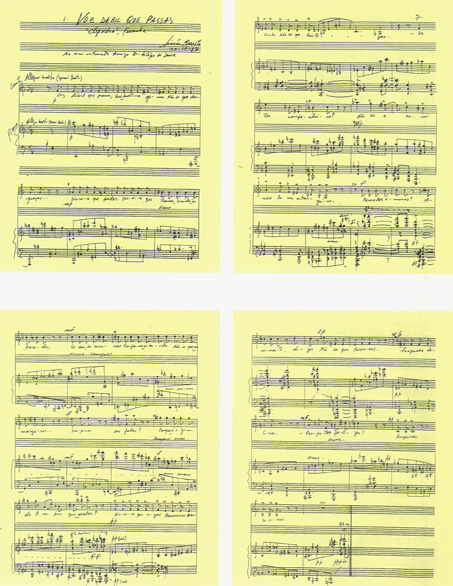
"Voz Débil Que Passas"
("Week Voice That Passes By")
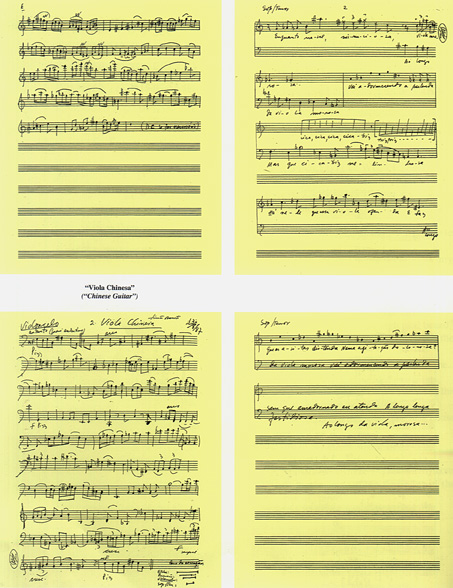
"Viola Chinesa"
("Chinese Guitar")
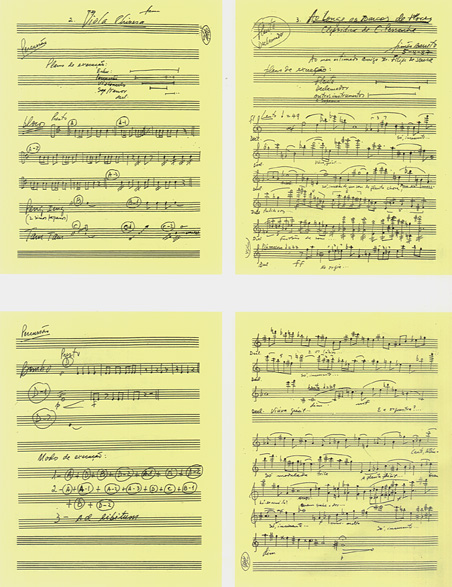
"Ao Longe os Barcos de Flores")
("Flower Boats in the Distance")
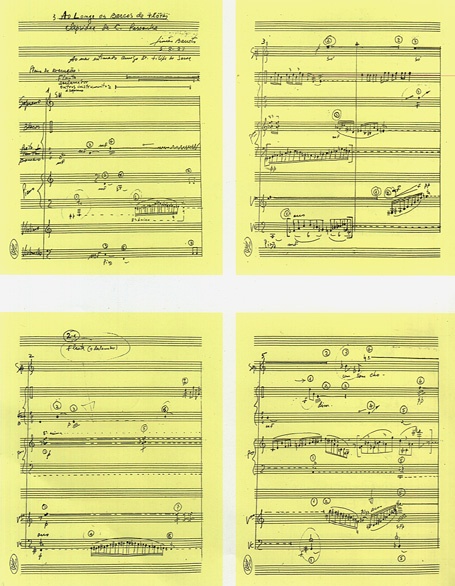
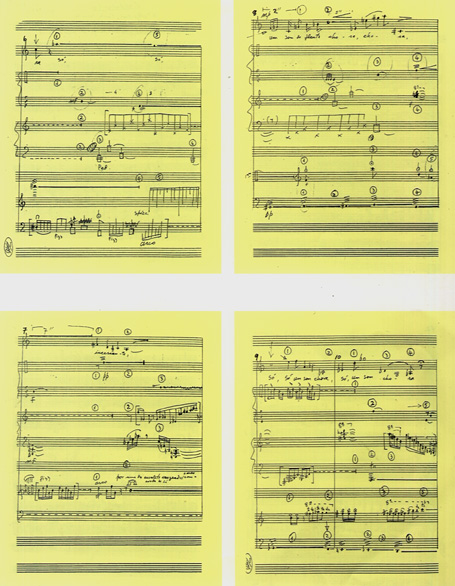
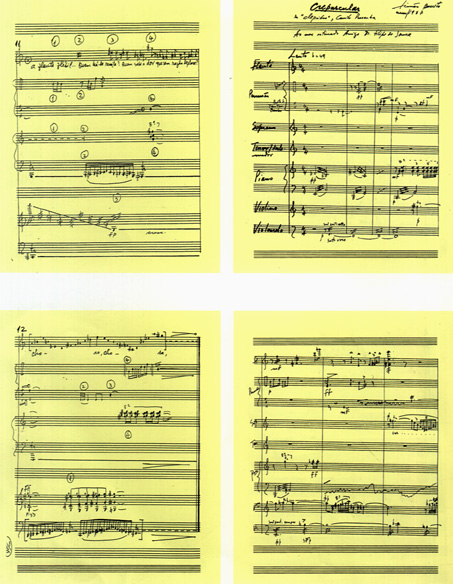
"Crepuscular"
("Twilight")
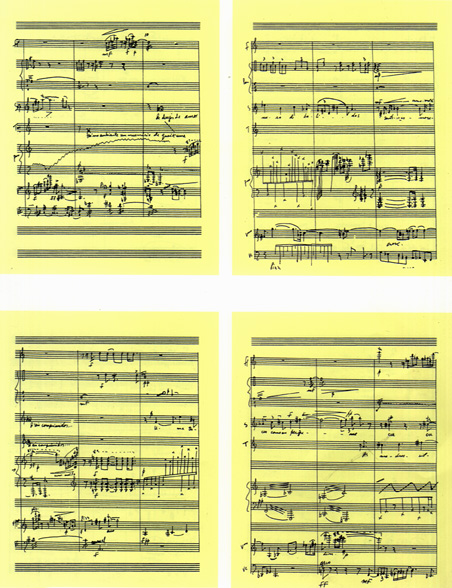
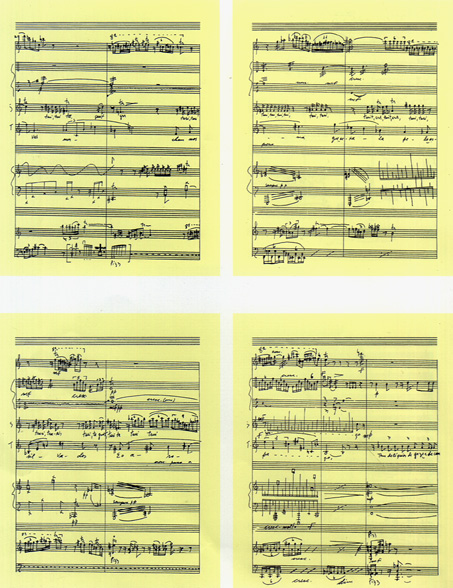
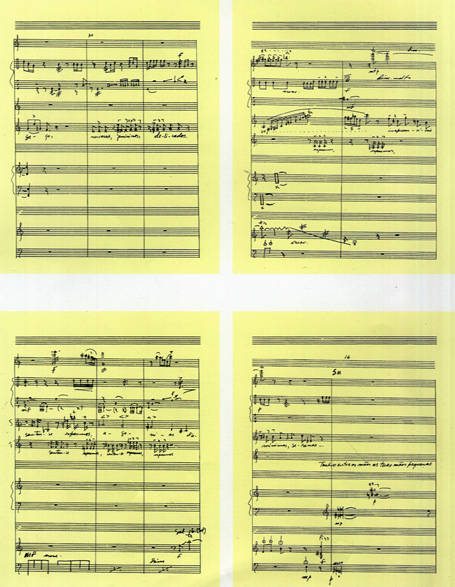
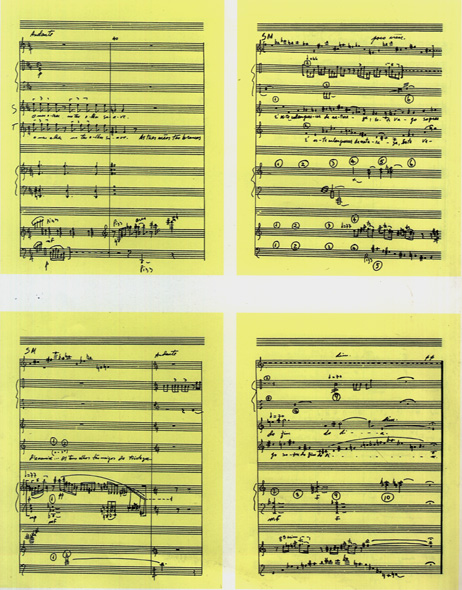
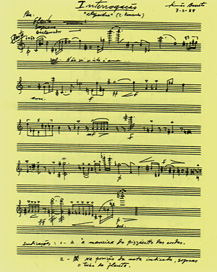
"Interrogação"
("Interrogação")
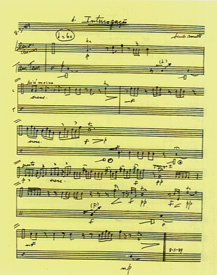
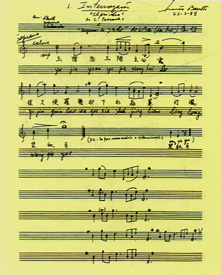
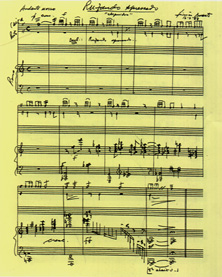
"Rufando Apressado"
("Drum Roll")
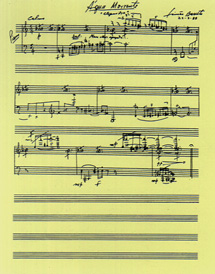
"Água Morrente"
("Dying Water")
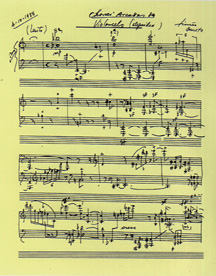
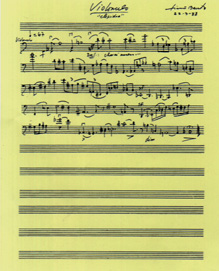
"Violoncelo"
("Violoncello")
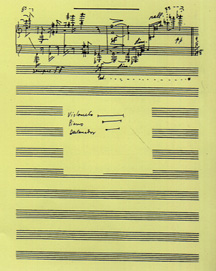
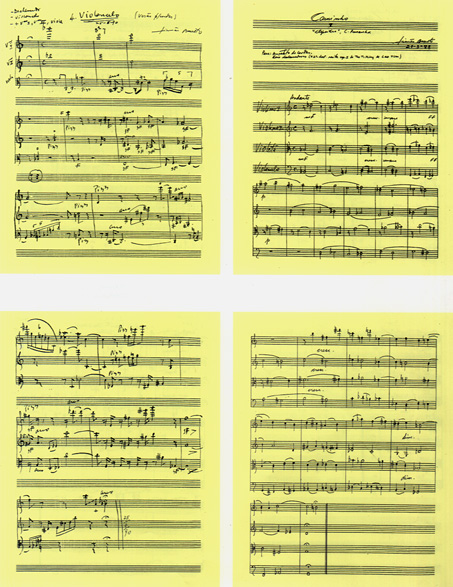
"Caminho I"
("Road I")
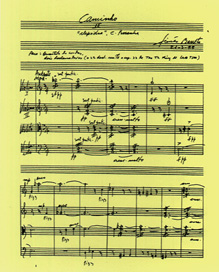
"Caminho II"
("Road II")
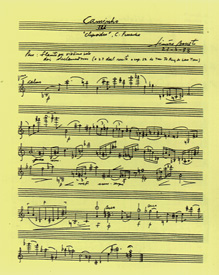
"Caminho III"
("Road III")
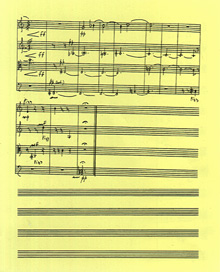
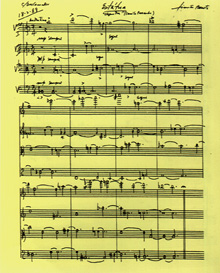
"Estátua"
("Statue")
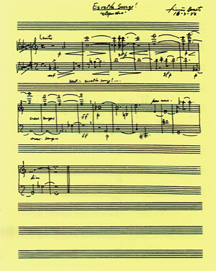
"Esvelta Surge"
("Svelte, She Emerges")
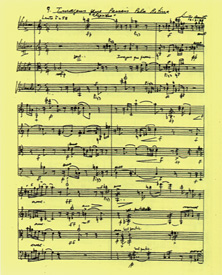
"Imagens que Passais pela Retina"
("Images that Pass by the Retina")
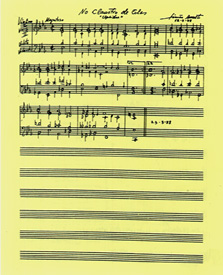
"No Claustro de Celas"
("In the Cloister of the Cells")
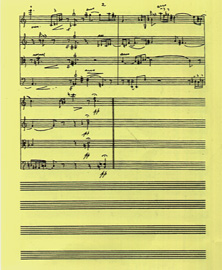
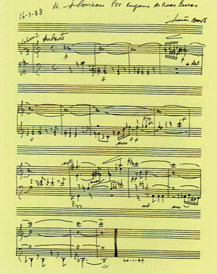
"Floriram por Engano as Rosas Bravas"
("Wild Roses Blossomed by Mistake")
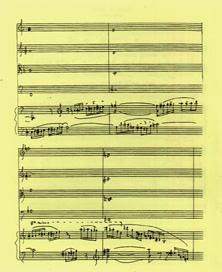
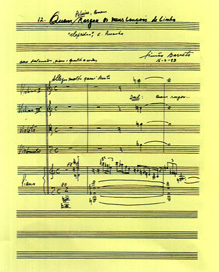
"Quem Poluiu, Quem Rasgou os Meus Lençóis de Linho"
("Who Polluted, Who Tore My Linen Sheets?")
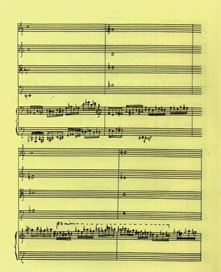
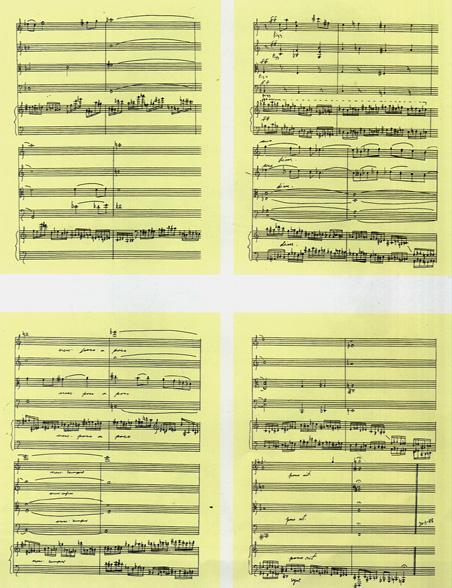
* Conductor, composer and musical critic. Head of the Sec~'gão de Música (Department of Music) of the Conservatório de Macau (Macao Conservatory), in Macao.
start p. 72
end p.